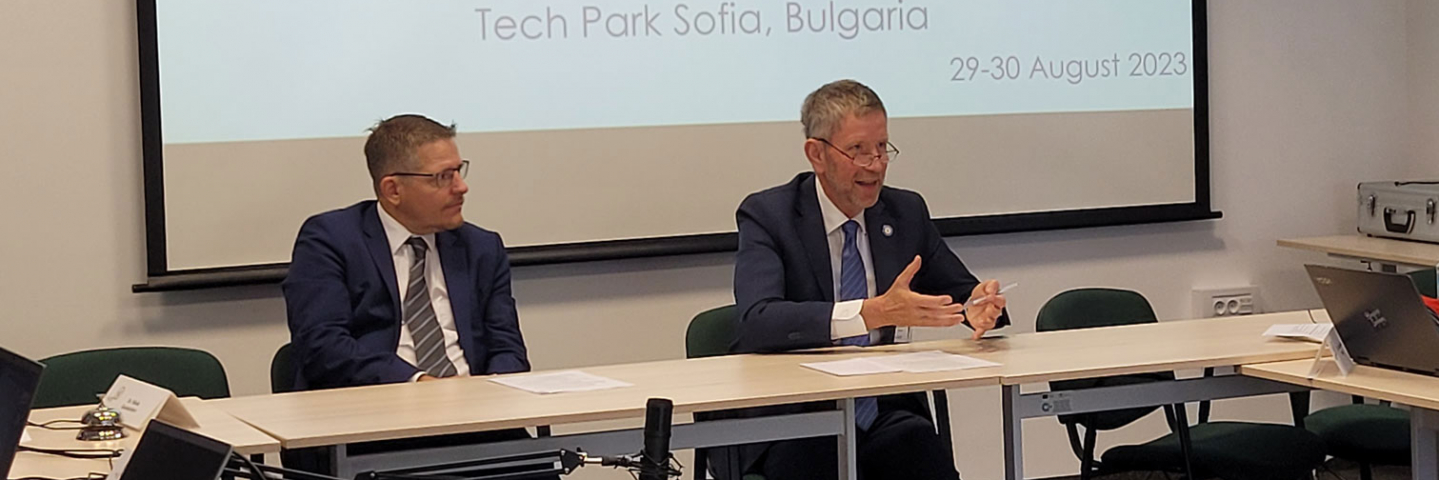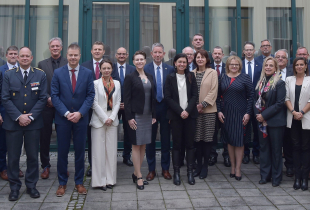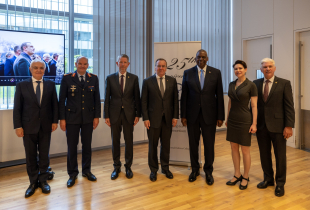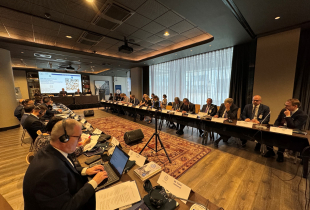
Partnership for Peace Consortium Discusses Cognitive Warfare
During a period defined by rapid advances in Artificial Intelligence, neurotechnology and a swiftly transforming global threat landscape, the Partnership for Peace Consortium Emerging Security Challenges Working Group recently examined "Neurotechnology, Artificial Intelligence, and the Future of Cognitive Warfare" at an event, co-hosted by Bulgaria's Cybersecurity Laboratory at Sofia Tech Park Aug. 29-30. The event was executed in strategic partnership with the Geneva Center for Security Policy. Over the period of two days, a distinguished panel of thought leaders, policy architects, security strategists and key stakeholders dissected the complex web of technological, ethical and geopolitical facets of cognitive warfare.
The Context: Cognitive Warfare Unveiled
Prof. George Sharkov of Bulgaria Cybersecurity Laboratory highlighted, "The most critical infrastructure is the human mind. That is why it has become a battlefield." As the cognitive realm emerges as a distinct battlefield, a novel concept, cognitive warfare, is rapidly gaining traction. Situated at the intersection of influence operations, information warfare and cyber operations, Cognitive Warfare aims to reshape the decision-making processes of adversaries by manipulating their conscious and subconscious understanding. It exploits the vulnerabilities of human cognition to fulfill strategic objectives. With the growing proliferation of digital technologies, cognitive manipulation can be achieved at an unprecedented scale, making it a quintessential form of 21st-century conflict.
The Technological Frontier: Where Innovation Meets Conflict
The digital revolution, typified by an explosion of data and a ubiquitous network of digital devices, has armed state and non-state actors with the ability to conduct large-scale cognitive operations with granular targeting and cost-effectiveness. The conference emphasized how emerging technologies such as neurotechnology and “metaverse” platforms offer new capabilities that could amplify the scale and effectiveness of cognitive warfare operations.
AI and Cognitive Warfare: A Double-Edged Sword
Dr. Sae Schatz of The Knowledge Force LLC shared, “Artificial Intelligence, and particularly the latest advancements in Deep Learning, lets us scale human capabilities such as pattern recognition, decision making, and narrative generation to a scope and speed that’s nearly unfathomable. This offers so much promise: Imagine personalized AI tutors for each student or robotic automation of the most dangerous jobs. But it also creates vulnerabilities. We already see early examples of AI automating online disinformation campaigns, and for the future, we can imagine some frightening possibilities: Bad actors using it to make neuro-profiles of high-value individuals to guide targeted attacks or, in authoritarian states, scanning neurocognitive and behavioral patterns for divergent thoughts among the population.” Topics discussed included the challenges associated with data dependence, algorithmic bias and ethical quandaries around information accuracy, privacy and intellectual property.
The Geopolitical Theater: A Global Arms Race in Cognitive Warfare
The conference underlined the global militarization of AI, from the pioneering efforts by the United States and its allies, to Russia's interests in embedding AI into its cyber-operations framework. China's People's Liberation Army is also increasingly turning its attention towards cognitive warfare, influenced by geopolitical shifts such as the Arab Spring.
A Path Forward
Dr. Sae Schatz further noted, “In other words, AI, in combination with the other disciplines that comprise the domain of cognitive warfare, could be used for boundless good but also, maybe, for disconcerting ends, if we fail to establish ethical norms or to protect ourselves against those who would use it maliciously. This workshop is a good step in that direction: Helping us consider these important questions and to work towards measured solutions. We need to continue such dialogues, especially in multidomain and multinational contexts.”
Conference Key Takeaways
- Novel Strategies: Cognitive warfare isn't new but is now taking on new dimensions through advancements in AI and neurotechnology.
- Domain Discussions: Cognitive warfare might soon be classified as a sixth domain of warfare, though debate continues about its intersection with existing military domains and national power instruments.
- Core Concepts: The manipulation and control of emotions and decision-making are fundamental to cognitive warfare.
- AI’s Growing Influence: Technological advancements in AI offer a glimpse into future strategies for influencing human cognition.
- Neuroscientific Tools: Advances in neuroscience technologies provide innovative means to conduct cognitive warfare.
- NATO ACT: The concept of cognitive warfare is increasingly being integrated into NATO ACT, potentially setting the stage for significant doctrinal changes.
- PfPC's Ongoing Contributions: The conference demonstrated PfPC’s pivotal role in clarifying and advancing the concept of cognitive warfare, setting the foundation for future research and policy decisions.
Conclusion – A Topic Worth Exploring
The conference marks a significant milestone in evolving our collective understanding of cognitive warfare. By focusing equally on ethical considerations and the burgeoning potential of new technologies, it aims to foster a more secure and ethically responsible global landscape. This aligns closely with PfPC’s and ESC WG's broader mission of equipping decision-makers with the tools and knowledge they need to navigate an increasingly complex and digitally-driven world. As the field of cognitive warfare continues to develop, the PfP Consortium is eager to partner with academics and practitioners in the field to help Euro-Atlantic policy makers find measured solutions to the multifaceted challenges posed by this emerging domain.
About the PfP Consortium and ESC WG
The Partnership for Peace Consortium (PfPC) is a voluntary association comprising over 800 defense academies and security studies institutes across 59 countries. Founded in 2012, the Emerging Security Challenges Working Group (ESC WG) aims to strengthen the capability of policymakers to identify and respond to evolving security challenges. Over recent years, the ESC WG has closely monitored hybrid threats and the impact of emerging technologies on international security.


